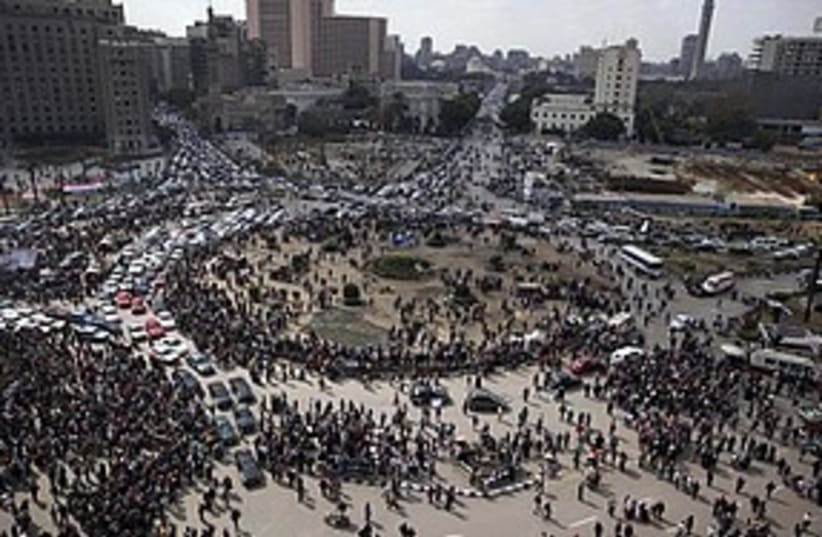RELATED:Barak: IDF needs to deal with changing MideastAnalysis: New IDF chief faces an axis of evilIsrael must keep eye on Egypt’s old guardWhile there is deemed to be some possibility that such demonstrations will take place in the near future in the spirit of Egypt, Tunisia and Iran, a senior officer said it was more likely that the Palestinian Authority would prevent this from happening until after elections in September.One senior officer said commanders were discussing ways to counter and contain large demonstrations launched simultaneously in different parts of the West Bank.“We are preparing different responses for different scenarios to think about what we will do if there are, for example, 30 marches of several thousand people each,” the officer said. “This is something we have yet to encounter.”One step the IDF is taking is to set up rapid-response teams that can quickly maneuver throughout the West Bank and arrive at the scene of a demonstration in its early stages in an attempt to contain it. During the summer, the Border Police are expected to establish a new command in the West Bank after the Arava District is dismantled.In addition, the IDF is locating strategic hilltops that can be used as vantage points from which the military could deploy reconnaissance and surveillance teams to track developments inside Palestinian towns and cities.The concern is that in the event of multiple large-scale demonstrations, the IDF will not know how to effectively respond and contain the protests, which could lead to a high number of casualties. As a result, commanders have been instructed to prepare their soldiers mentally for how to respond in such scenarios.Israel has been keeping a close eye on Palestinian cities in recent weeks since the revolution in Egypt, to ensure that the violence does not spread to the West Bank.According to intelligence assessments, the Palestinians are currently interested in continuing with their plans to build up and reform the institutions they would require for statehood if they decided to make a unilateral declaration following elections in September.Even after September, the IDF believes the PA will maintain its high-level and almost daily security coordination with the IDF. But, it is thought, the PA could, at the same time, allow and even possibly encourage civilians to launch so-called nonviolent resistance to delegitimize Israel.
IDF prepares over fears of Egypt-style W. Bank demos
Military begins building rapid-response teams to be used to contain potential marches, protests by Palestinians.

RELATED:Barak: IDF needs to deal with changing MideastAnalysis: New IDF chief faces an axis of evilIsrael must keep eye on Egypt’s old guardWhile there is deemed to be some possibility that such demonstrations will take place in the near future in the spirit of Egypt, Tunisia and Iran, a senior officer said it was more likely that the Palestinian Authority would prevent this from happening until after elections in September.One senior officer said commanders were discussing ways to counter and contain large demonstrations launched simultaneously in different parts of the West Bank.“We are preparing different responses for different scenarios to think about what we will do if there are, for example, 30 marches of several thousand people each,” the officer said. “This is something we have yet to encounter.”One step the IDF is taking is to set up rapid-response teams that can quickly maneuver throughout the West Bank and arrive at the scene of a demonstration in its early stages in an attempt to contain it. During the summer, the Border Police are expected to establish a new command in the West Bank after the Arava District is dismantled.In addition, the IDF is locating strategic hilltops that can be used as vantage points from which the military could deploy reconnaissance and surveillance teams to track developments inside Palestinian towns and cities.The concern is that in the event of multiple large-scale demonstrations, the IDF will not know how to effectively respond and contain the protests, which could lead to a high number of casualties. As a result, commanders have been instructed to prepare their soldiers mentally for how to respond in such scenarios.Israel has been keeping a close eye on Palestinian cities in recent weeks since the revolution in Egypt, to ensure that the violence does not spread to the West Bank.According to intelligence assessments, the Palestinians are currently interested in continuing with their plans to build up and reform the institutions they would require for statehood if they decided to make a unilateral declaration following elections in September.Even after September, the IDF believes the PA will maintain its high-level and almost daily security coordination with the IDF. But, it is thought, the PA could, at the same time, allow and even possibly encourage civilians to launch so-called nonviolent resistance to delegitimize Israel.